




When it comes to installing a washing machine in your home, there are a few important factors to consider. While it may be tempting to place your machine anywhere that is convenient, it’s crucial to follow proper installation guidelines to ensure optimal performance and avoid potential problems.
Location is key
The first thing to consider when choosing a location for your washing machine is the availability of water and electrical connections. It’s important to place your machine near a water supply, preferably with a dedicated hot and cold water outlet. Additionally, ensure that there is a nearby electrical outlet to power your machine.
Noise and vibration
Another factor to consider is the noise and vibration produced by your washing machine. Placing it on a solid and level surface can help minimize both. If possible, it’s also a good idea to position your machine away from living areas or bedrooms to avoid disturbing others.
Maintenance and accessibility
Finally, it’s important to consider maintenance and accessibility when choosing a location for your washing machine. You’ll want to ensure that there is enough space around the machine to easily access it for regular maintenance tasks, such as cleaning the filter or checking for any blockages.
By taking these factors into consideration, you can ensure that your washing machine is installed in the most suitable location for optimal performance and convenience. If you have any doubts or questions, it’s always best to consult with a professional installer or refer to the manufacturer’s guidelines.
At Company Name, we have a team of experts who can provide you with further advice and tips on installing a washing machine. Contact us today to learn more!
Can You Put a Washing Machine Anywhere?
When it comes to placing a washing machine, there are a few factors to consider. While technically you can put a washing machine anywhere in your home, there are some important considerations to keep in mind for optimal functioning and convenience.
1. Plumbing and Water Supply
A washing machine requires access to both plumbing and a water supply. If you want to place a washing machine in an area that doesn’t have these, you’ll need to make the necessary adjustments. This may involve hiring a plumber to install the required plumbing connections.
2. Electrical Outlet
Another important consideration is the availability of an electrical outlet near the desired location for the washing machine. Washing machines require a dedicated electrical circuit, so ensure there is one in close proximity or have an electrician install one if necessary.
3. Ventilation
Adequate ventilation is crucial for washing machines. They generate heat and moisture during the washing process, which needs to be properly ventilated to prevent the growth of mold and mildew. Placing a washing machine in a closed area without proper ventilation can lead to these issues.
4. Level Surface
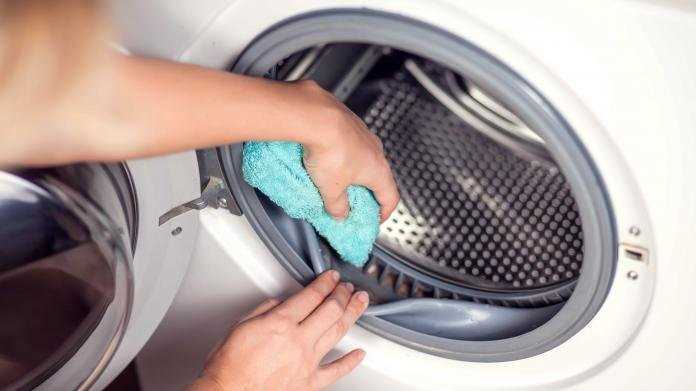
A washing machine needs to be placed on a sturdy, level surface to function properly. Ensure that the floor or platform where you plan to place the machine is stable and able to handle the weight of the appliance.
5. Space Availability
Consider the available space and accessibility when choosing a location for your washing machine. Make sure there is enough room for the machine to be loaded and unloaded comfortably, as well as space for the door to open fully.
6. Noise and Vibration
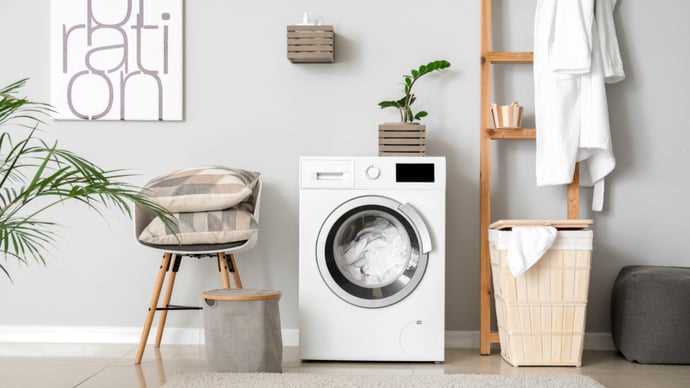
Washing machines can produce noise and vibration, especially during the spin cycle. This can be disruptive if the machine is placed in a shared living space or near sleeping areas. Consider the noise and vibration levels of the washing machine and choose a location that minimizes disturbance to others.
7. Running Drainage
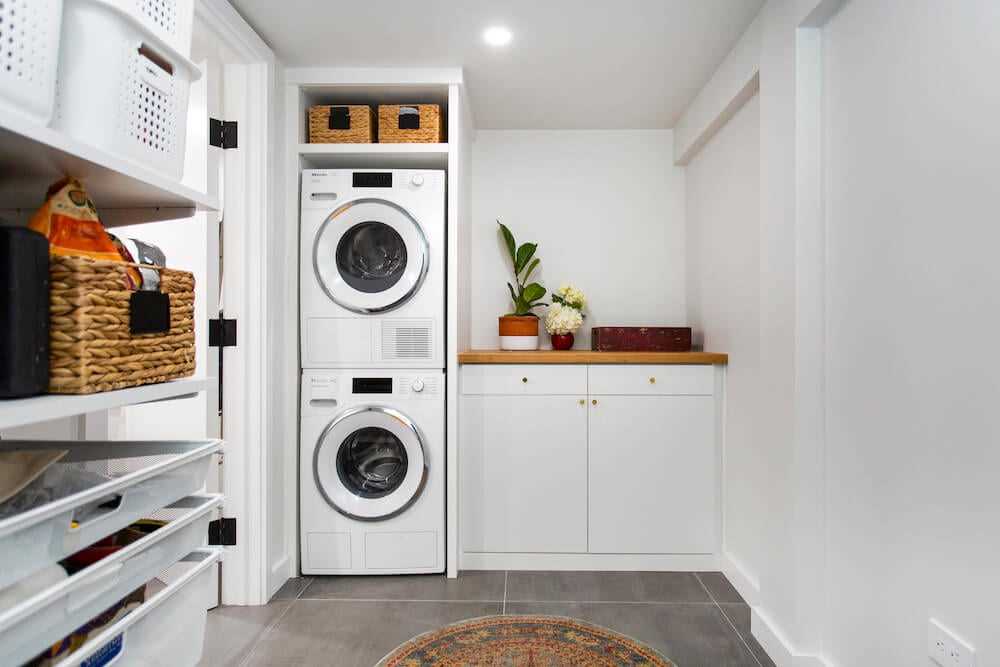
Having a running drainage system nearby is essential for a washing machine. It needs to be able to drain water efficiently after each cycle. If there isn’t a drain in the area you plan to place the machine, you may need to install one or find an alternative solution.
Conclusion
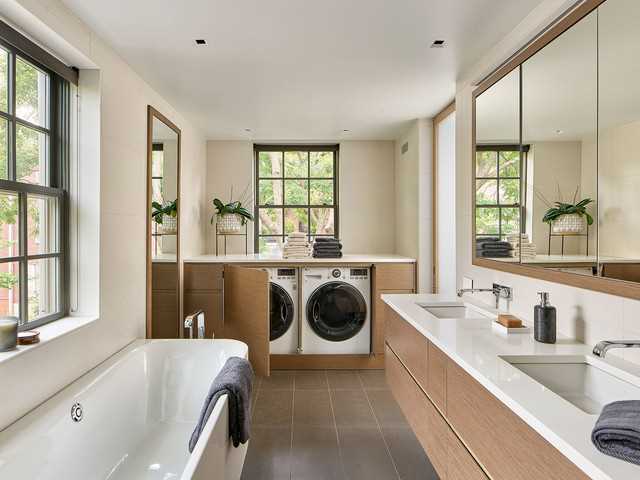
While you can technically place a washing machine anywhere in your home, it’s important to consider factors such as plumbing, electrical supply, ventilation, level surface, space availability, noise, vibration, and drainage. Taking these factors into account will ensure that your washing machine is placed in an optimal location for efficient and convenient use.
Expert Advice and Tips
1. Choose the Right Location
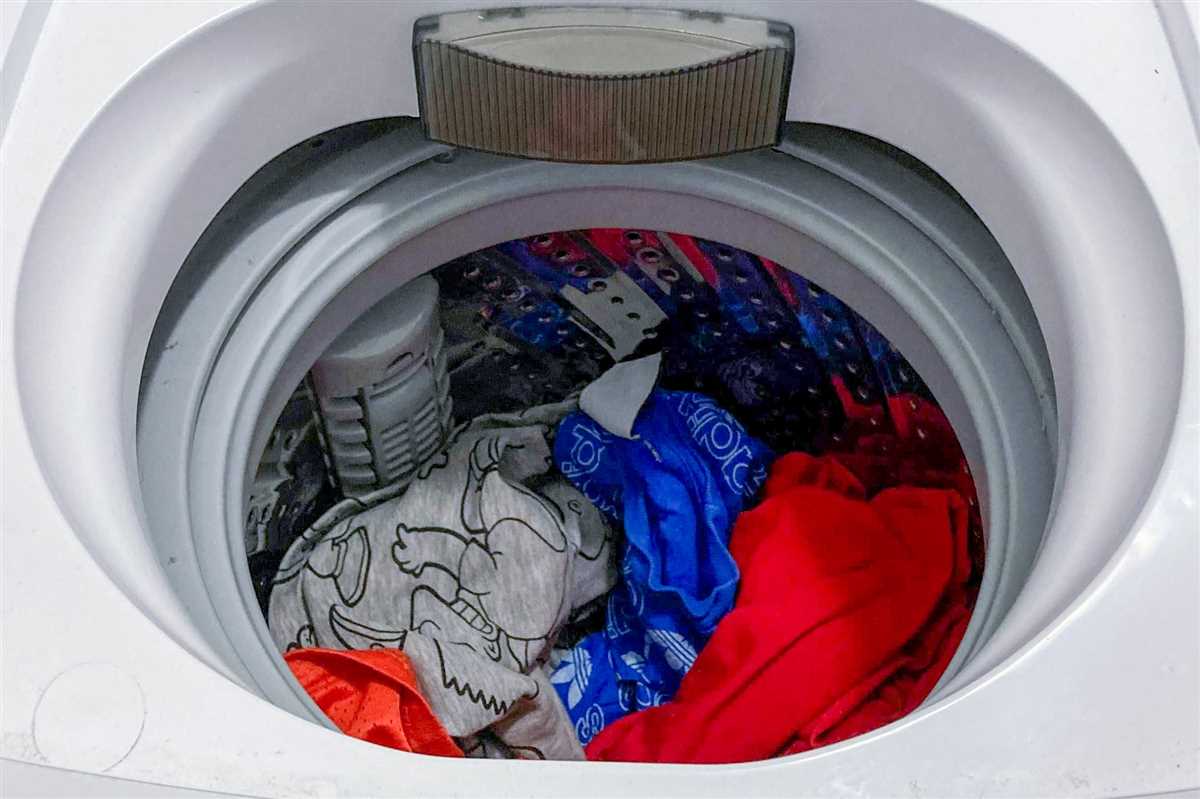
When considering where to put your washing machine, it’s important to choose a location that is convenient for you and meets the necessary requirements. The ideal location should have access to water and drainage connections. It should also be well-ventilated and have enough space for the machine to function properly.
2. Check the Power Supply
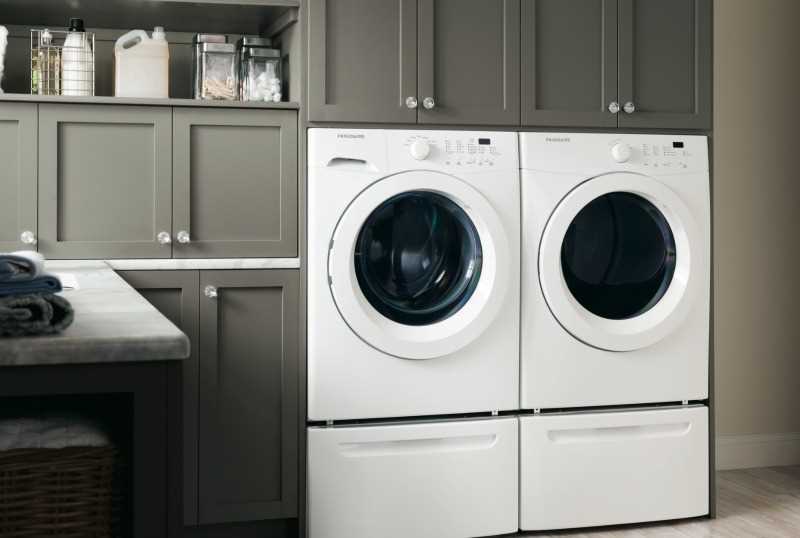
Before installing your washing machine, make sure the location has a suitable power supply. Most washing machines require either a 110V or 220V outlet, depending on the model. It’s essential to have a dedicated outlet that meets the electrical requirements of your specific machine to ensure safety and proper functioning.
3. Consider Noise and Vibration
Washing machines can be noisy, especially during the spin cycle. To minimize noise and vibrations, it’s advisable to place the machine on a stable and level surface. You can also use anti-vibration pads to absorb some of the vibrations and reduce noise levels. Additionally, placing the machine away from living areas or bedrooms can help reduce disruption caused by noise.
4. Ensure Proper Drainage
Proper drainage is essential for the efficient functioning of the washing machine. Ideally, the machine should be located near a drain or have access to a drainpipe for easy water discharge. It’s crucial to avoid using long or narrow drain hoses, as this can lead to clogging and inefficient drainage.
5. Allow for Sufficient Ventilation
Washing machines generate heat and moisture during operation. It’s important to provide adequate ventilation in the laundry area to prevent the buildup of excess heat and moisture. This can help prevent mold and mildew growth and improve the lifespan of the machine.
6. Follow Manufacturer’s Instructions
Always refer to the manufacturer’s instructions and guidelines when installing a washing machine. Each machine may have specific requirements and recommendations for installation. Following these instructions will ensure the machine operates efficiently and safely.
7. Consider Floor Load
Washing machines can be heavy, especially when filled with water and clothes. It’s important to consider the load-bearing capacity of the floor where you plan to install the machine. Ensure the floor is strong enough to support the weight of the machine to avoid any structural damage.
8. Seek Professional Help if Needed
If you’re unsure about the installation process or encounter any difficulties, it’s recommended to seek professional help. A qualified technician or plumber can ensure the washing machine is installed correctly and provide additional guidance specific to your situation.
9. Regular Maintenance and Cleaning
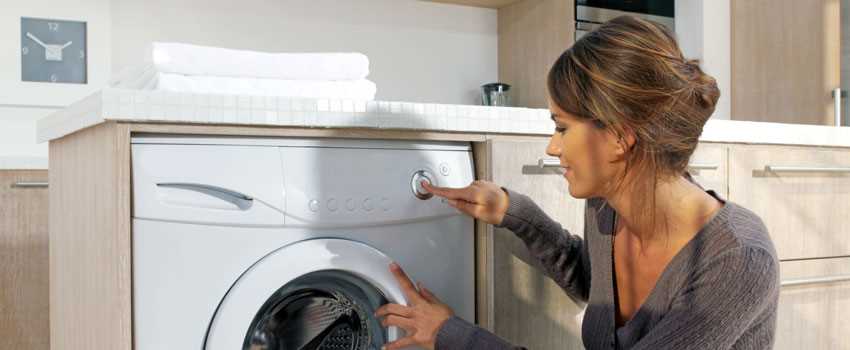
To keep your washing machine functioning optimally, it’s essential to perform regular maintenance and cleaning. Follow the manufacturer’s instructions for cleaning the machine and its various components. Regular maintenance can help prevent issues and prolong the lifespan of your washing machine.
10. Know When to Replace
While proper maintenance can extend the lifespan of your washing machine, there may come a time when it needs to be replaced. Signs that your machine may need replacement include frequent breakdowns, inefficient performance, and excessive repair costs. Consider investing in a new washing machine when the time comes.
Choosing the Right Location
When it comes to installing a washing machine, choosing the right location is essential. The location you choose can affect the convenience, efficiency, and even the lifespan of your washing machine. Here are some important factors to consider when selecting a spot for your washing machine:
- Accessibility: Ensure the location is easily accessible, both for installation and for frequent use. A laundry room or bathroom with ample space is ideal.
- Plumbing: Choose a location near existing plumbing lines to avoid extensive modifications. This will minimize installation costs and ensure proper functioning of your machine.
- Drainage: Your washing machine will need access to a drain for water disposal, so consider placing it near an existing drain or where a drain can be easily installed.
- Noise: Washing machines can be noisy, especially during the spin cycle. Think about the noise level and whether it will be disruptive to nearby living spaces.
- Ventilation: Adequate ventilation is important to prevent mold and mildew growth. Ensure the location has good air circulation and consider using a vent hose to expel excess steam.
- Level Surface: Your washing machine should be installed on a flat, level surface to ensure proper operation. Avoid uneven surfaces or locations prone to shifting.
Remember to consult the manufacturer’s guidelines for specific installation requirements. Taking the time to choose the right location for your washing machine will result in a more efficient and enjoyable laundry experience.
Installation Requirements
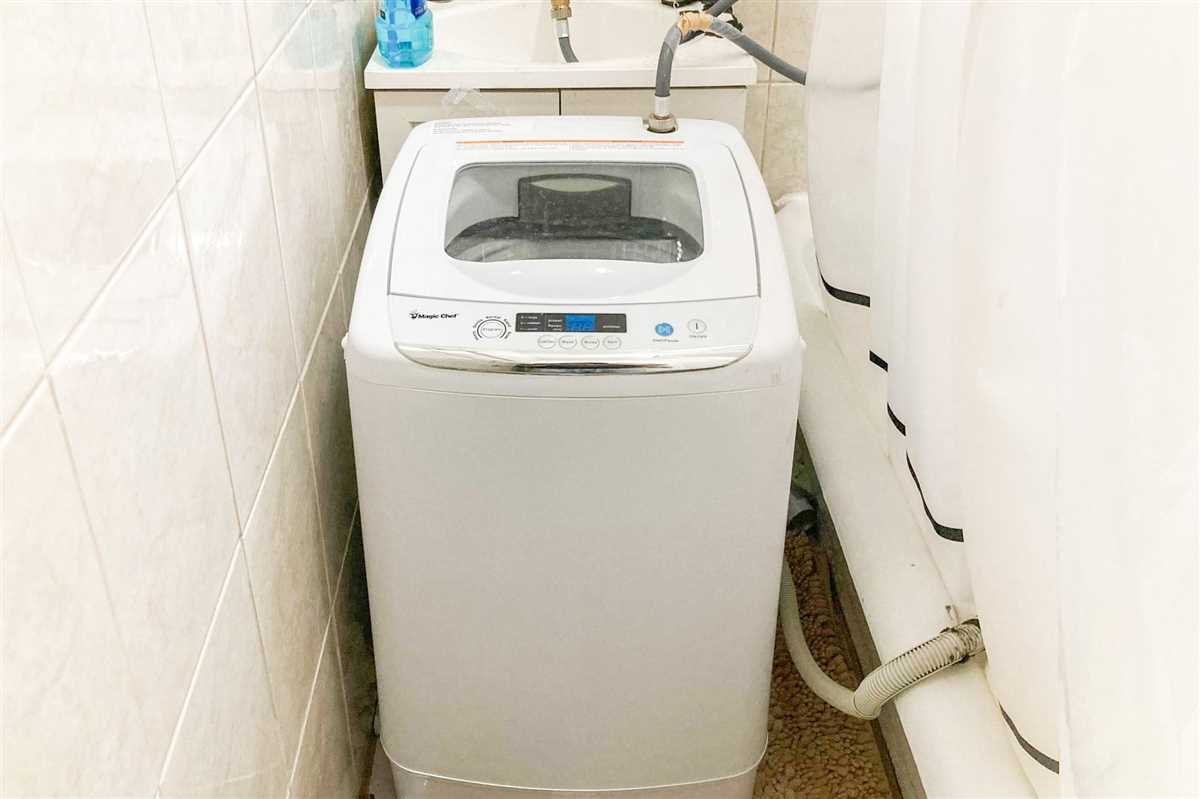
When it comes to installing a washing machine, there are a few important requirements that you need to consider. This ensures that your washing machine functions properly and safely. Below are some key installation requirements to keep in mind:
- Location: Choose a suitable location for your washing machine. It should be on a flat, stable, and level surface to prevent any vibration or movement during operation. Avoid placing it on soft or uneven flooring.
- Space: Make sure there is enough space around the washing machine for proper ventilation. This allows air to flow and prevents overheating. Leave some space between the walls and other appliances to ensure easy access for maintenance and repairs.
- Water Supply: Connect your washing machine to a reliable water supply source. It should have a shut-off valve nearby for easy accessibility in case of emergencies or repairs. Check the water pressure requirement specified by the manufacturer.
- Drainage: Ensure proper drainage for your washing machine. It should be connected to a drainpipe or a drainage system that can handle the amount of water discharged during the washing cycle. Avoid using extension hoses, as they can cause drainage issues or water leaks.
- Electrical Connection: Follow the manufacturer’s guidelines for the electrical connection of your washing machine. Make sure it is grounded and connected to a suitable power outlet with the correct voltage and amperage. Avoid using extension cords or adapters, as they could lead to overload and safety hazards.
- Leveling: Use a spirit level to ensure that your washing machine is leveled properly. This helps in balancing the load during operation and prevents unnecessary vibrations or noise. Adjust the machine’s feet if necessary to achieve a level position.
- Installation Assistance: If you are unsure about the installation process or encounter any difficulties, it is recommended to seek professional assistance. They have the expertise and knowledge to install your washing machine correctly and safely.
By following these installation requirements, you can ensure the proper functioning and longevity of your washing machine. It is crucial to adhere to them to prevent any potential damage or accidents during operation.
Considerations for Small Spaces
When it comes to small spaces, there are some important factors to consider before placing a washing machine. Here are a few things to keep in mind:
Size and Dimensions
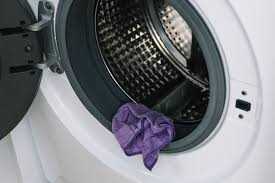
Make sure to measure the available space in your small area to ensure that the washing machine will fit comfortably. Consider the height, width, and depth of the space, as well as any additional clearance needed for opening doors or accessing controls.
Additionally, think about the size and capacity of the washing machine itself. Compact models are often designed specifically for small spaces and can accommodate smaller loads.
Installation Requirements
Check the installation requirements for the washing machine to ensure that your small space can accommodate them. Some machines may require certain electrical or plumbing connections that could be challenging in limited spaces.
Consider the accessibility of the area as well. Ensure that there is enough space around the machine for you to comfortably load and unload laundry. Also, check if there are any regulations or restrictions in your building or neighborhood that may affect the placement of a washing machine.
Noise and Vibration
Washing machines can produce noise and vibration during operation, which can be amplified in small spaces. Look for models that offer features such as insulation or anti-vibration technology to minimize disruptive noise and movement.
Utility Considerations
Consider the utility requirements of the washing machine. Check if your small space can support the necessary electrical and plumbing connections. Ensure that the area has proper ventilation to prevent moisture buildup and promote drying.
Alternative Options
If space is extremely limited, you may need to consider alternative options like compact washer-dryer combos or portable washing machines. These can be great alternatives for small spaces where traditional washing machines may not fit.
Conclusion
While it is possible to put a washing machine in a small space, careful consideration must be given to size constraints, installation requirements, noise and vibration, utility considerations, and alternative options. By taking these factors into account, you can find a suitable washing machine that fits well in your small space.
Company Name
About Us
Company Name is a leading provider of washing machine solutions for households and businesses. With years of experience in the industry, we have gained a reputation for delivering high-quality products and exceptional customer service.
Our Products
We offer a wide range of washing machines designed to meet the diverse needs of our customers. Our product line includes top-loading, front-loading, and compact washing machines, all equipped with advanced features and technologies to ensure efficient and effective cleaning.
Expert Advice and Tips
At Company Name, we believe in providing more than just washing machines. We strive to educate and empower our customers with expert advice and tips on how to properly use and maintain their washing machines. Our team of knowledgeable professionals is always available to answer any questions and provide guidance on troubleshooting common issues.
Installation Services

We understand that installing a washing machine can be a complicated task. That’s why we offer professional installation services to ensure a seamless and trouble-free setup. Our technicians are skilled and experienced in handling various types of washing machines and will ensure that your appliance is installed correctly and safely.
Customer Support
Customer satisfaction is our top priority, and we are committed to providing excellent support to our customers. Whether you have a question about our products, need assistance with troubleshooting, or require any other assistance, our dedicated customer support team is here to help. We strive to resolve any issues promptly and effectively to ensure a positive customer experience.
Conclusion
Company Name is your trusted partner for all your washing machine needs. From high-quality products to expert advice, professional installation, and superior customer support, we are here to exceed your expectations. Choose Company Name for a reliable and hassle-free washing machine solution.
FAQ
Can I put a washing machine in my bathroom?
Yes, you can put a washing machine in your bathroom as long as there is enough space and the necessary connections are available.
Can I install a washing machine in my kitchen?
Yes, you can install a washing machine in your kitchen if there is enough space and the necessary plumbing and electrical connections are present.
Is it possible to put a washing machine in a bedroom?
No, it is not recommended to put a washing machine in a bedroom as it can cause noise and vibration that may disturb your sleep. It is best to place it in a dedicated laundry area or utility room.
Can I put a washing machine on the second floor of my house?
Yes, you can put a washing machine on the second floor of your house if the floor can support the weight and there are proper plumbing and electrical connections available.
Is it safe to put a washing machine in a garage?
Yes, it is generally safe to put a washing machine in a garage as long as the area is well-ventilated and protected from extreme temperatures. However, you should ensure that the necessary plumbing and electrical connections are in place.
Can I put a washing machine in my bathroom?
Yes, you can put a washing machine in your bathroom as long as there is enough space and proper plumbing connections.
Is it possible to install a washing machine in a small kitchen?
Yes, it is possible to install a washing machine in a small kitchen as long as there is enough space and access to water and drainage connections.















